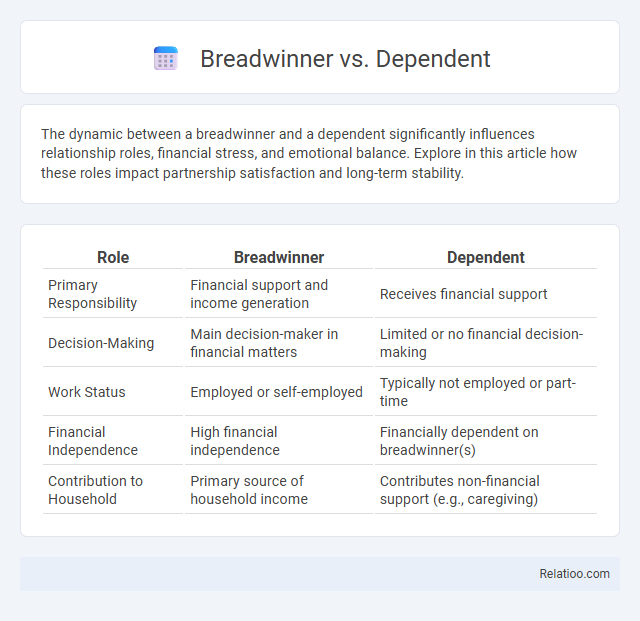The dynamic between a breadwinner and a dependent significantly influences relationship roles, financial stress, and emotional balance. Explore in this article how these roles impact partnership satisfaction and long-term stability.
Table of Comparison
| Role | Breadwinner | Dependent |
|---|---|---|
| Primary Responsibility | Financial support and income generation | Receives financial support |
| Decision-Making | Main decision-maker in financial matters | Limited or no financial decision-making |
| Work Status | Employed or self-employed | Typically not employed or part-time |
| Financial Independence | High financial independence | Financially dependent on breadwinner(s) |
| Contribution to Household | Primary source of household income | Contributes non-financial support (e.g., caregiving) |
Understanding the Breadwinner and Dependent Roles
The breadwinner is the primary income earner in a household, responsible for providing financial stability and meeting essential needs such as housing, food, and education. The dependent relies on the breadwinner for financial support, often encompassing children, elderly family members, or non-working spouses. Understanding these roles clarifies family dynamics and highlights the economic and emotional responsibilities tied to each position.
Historical Perspectives on Family Income Dynamics
Historical perspectives on family income dynamics reveal a complex interplay between breadwinners and dependents, shaped by socio-economic transformations and gender roles. You navigate a legacy where traditional breadwinner models dominated, often positioning one income source as primary while others remained financially dependent. Modern shifts towards dual-income households reflect changing economic demands and evolving cultural expectations around financial responsibility.
Economic Implications of Being the Breadwinner
Being the breadwinner significantly impacts your financial stability, as you bear primary responsibility for income generation and household expenses, influencing economic decision-making and stress levels. Economic implications include increased pressure to maintain steady employment, potential career sacrifices by dependents, and the risk of financial vulnerability if income sources are disrupted. This role also affects access to credit, savings potential, and wealth accumulation, shaping the overall economic wellbeing of your family unit.
Psychological Impact on Breadwinners and Dependents
Breadwinners often experience heightened stress and pressure due to financial responsibilities, which can impact their mental health by increasing anxiety and feelings of burden. Dependents may face reduced self-esteem and increased vulnerability, as reliance on others for financial support can affect their sense of independence and self-worth. The dynamic between breadwinner and dependent roles influences emotional well-being, where role imbalance may lead to tension, resentment, or psychological strain for both parties.
Gender Stereotypes in Breadwinner-Dependent Relationships
Gender stereotypes in breadwinner-dependent relationships often cast men as primary providers and women as caregivers, reinforcing traditional roles that limit both partners' potential. These stereotypes can affect your perception of financial responsibilities and decision-making within the household, creating imbalance and stress. Challenging these norms promotes equality and allows both partners to contribute based on skills and preferences rather than outdated gender expectations.
Shifts in Modern Household Structures
In modern household structures, the traditional breadwinner-dependent dynamic is increasingly fluid, with dual-income families becoming the norm and roles often reversing based on economic needs. Shifts in gender roles and workplace flexibility have expanded opportunities for dependents to contribute financially, challenging the one-sided breadwinner model. This evolution reflects broader societal changes toward equality and shared responsibilities in both domestic and financial realms.
Financial Stability and Decision-Making Power
Breadwinner roles often correlate with greater financial stability, as they contribute the primary income supporting the household's expenses and savings. Dependents typically rely on the breadwinner's income, which can limit their financial autonomy and decision-making influence within the family unit. Your financial stability and decision-making power increase significantly when you assume the breadwinner role, as control over resources often translates to greater influence on household financial decisions.
Challenges Faced by Dependents in Today’s Society
Dependents often encounter financial insecurity and limited access to opportunities due to reliance on breadwinners. Social expectations and stigma can exacerbate feelings of inadequacy and restrict personal growth. Your ability to navigate these challenges depends on building supportive networks and advocating for autonomy within the family dynamic.
Strategies to Balance Roles Within a Partnership
Balancing roles within a partnership where one partner is the breadwinner and the other is dependent requires clear communication and mutual respect for individual contributions. Strategies include setting shared financial goals, allocating household responsibilities based on strengths, and ensuring emotional support to maintain equity and partnership harmony. Your understanding of each other's needs fosters collaboration, preventing resentment and promoting a stable and supportive relationship.
Future Trends in Breadwinner and Dependent Dynamics
Future trends in breadwinner and dependent dynamics highlight a shift towards dual-income households driven by increasing female workforce participation and evolving gender roles. Advances in remote work technology and gig economy opportunities enable more flexible earning arrangements, blurring traditional distinctions between breadwinner and dependent. Your financial planning and household decision-making must adapt to these changing dynamics to optimize stability and growth.

Infographic: Breadwinner vs Dependent
 relatioo.com
relatioo.com